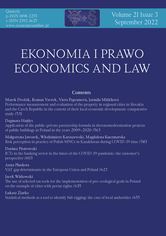Risk perception in practice of Polish MNCs in Kazakhstan during COVID-19 time
Risk perception in practice of Polish MNCs in Kazakhstan during COVID-19 time
Author(s): Małgorzata Jaworek, Włodzimierz Karaszewski, Magdalena KuczmarskaSubject(s): Supranational / Global Economy, Business Economy / Management, Economic policy, Health and medicine and law
Published by: Wydawnictwo Naukowe Uniwersytetu Mikołaja Kopernika
Keywords: foreign direct investment; FDI; risk;
Summary/Abstract: Motivation: The COVID-19 pandemic caused a major crisis in global economy. The year 2020 will be remembered in the history of global economy as the year of a massive supply and demand shock, and, consequently, a slump in economic growth in most countries. The effects of the pandemic will be felt to varying degrees by the majority of the world’s economic entities. One such effect is the radical decrease in global foreign direct investment (FDI). It is hard to assess now how heavily the pandemic will influence the longterm FDI trends. The perception of the pandemic risk is, however, likely to heighten. This article deals with foreign direct investment risks, and more specifically, with the pandemic risk seen as one of natural risks in COVID-19-related contexts. Aim: The article aims to identify how the enterprises with Polish capital in Kazakhstan perceive the pandemic risk in comparison with other FDI risks. The authors of this paper were co-investigators on a scientific research project concerning FDI in Kazakhstan as exemplified by the investment intensity of Polish enterprises. The project was carried out from 2019 to 2021, i.e., when the pandemic started and during its course. The research concept was, however, created before there were any signs of the pandemic. Therefore, the research questions regarding FDI risk in Kazakhstan were not to any extent inspired by this occurrence. Nevertheless, the question about the pandemic risk was included in the research tool. Thus, the perception of this risk became the subject of research. The findings of partial research that are presented in this article are original in nature, because the assessments constituting their basis were formulated at a time when Kazakhstan, like other countries around the world, struggled with the pandemic and when its effects were unknown. Results: According to the enterprises with Polish capital in Kazakhstan, the main areas of risk entailed in their operation in this country were, most importantly, the risks of the investment country and global risks. Local currency exchange risk ranked 1st; as many as 70% of respondents said that this risk perception was high. This was followed by global economic events (e.g. depression), performance risks (e.g. product price, transfer risks, the price of capital) and government policy risks (e.g. tax reforms, monetary reforms, price controls, trade restrictions, nationalisation, government regulation, barriers to earnings repatriation). The 5th most distinctly perceived risk by the studied enterprises was global social events risks, including the pandemic risk. 40% of the surveyed entities defined this risk perception as high, and 30% each as medium and small. The fact that the pandemic risk ranked 5th among other FDI risk components in Kazakhstan indicates its great significance to the enterprises operating there at an early stage of the COVID-19 pandemic, i.e., when the level of uncertainty caused by the pandemic in terms of both its economic and its social effects was very high.
Journal: Ekonomia i Prawo. Economics and Law
- Issue Year: 21/2022
- Issue No: 3
- Page Range: 583-601
- Page Count: 20
- Language: English

